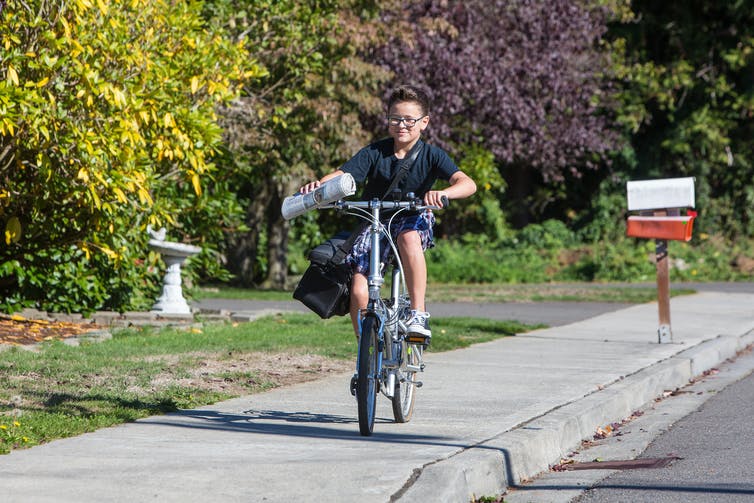Many seasonal companies are struggling to seek out sufficient staff once more this summer season. (AP Photograph/Matt Slocum)
As a baby and youth research researcher, I’m within the relationship between youngsters and work. After two years of lockdowns that stored many teenagers from working, the present labour scarcity gives many thrilling job alternatives for them this summer season. This can be particularly welcome information for individuals who have had a more durable time discovering work, corresponding to youthful and racialized teenagers.
Grade eight scholar Miriam, the daughter of one in all my colleagues, shared her pleasure with me about coming into the workforce. She is eager to attract on her babysitting expertise in her new job as a junior counsellor at a summer season day camp:
“I really feel excited but additionally nervous. I’ve by no means labored (in a proper job) earlier than. However I do know I’m fortunate to get it… I feel will probably be cool and attention-grabbing but additionally laborious and tiring. I feel I’ll actually prefer it and I do know I’ll like making my very own cash and assembly new pals.”
Early part-time work gives many alternatives for teenagers: incomes cash, constructing abilities and profession networks, growing friendships and fostering confidence and independence. And teenagers themselves typically have optimistic emotions about early, part-time work.
Younger staff are weak
There are additionally points that come up with early work, and a key one is well being and security. Younger staff are significantly weak as a result of they have a tendency to do short-term work, typically lack coaching and security schooling, and may even see damage as simply “a part of the job.”
Younger staff are additionally in unequal relationships of energy with employers, each as workers and due to their younger age. They lack the arrogance to talk up, and employers are much less more likely to take heed to them once they increase issues.hyperlink textual content

Half-time work gives alternatives for teenagers to earn cash, construct abilities and profession networks, develop friendships and foster confidence and independence.
(Shutterstock)
Dad and mom typically really feel positively about their kids working, resulting in some downplaying potential dangers. Threads of Life, a Canadian charity that helps households after a office fatality, discovered that two-thirds of companies in Canada plan to rent extra younger staff in 2022 than they’ve prior to now two years, however solely half have a security program.
Labour legal guidelines are provincial and differ throughout Canada. In most locations, kids between 14 and 16 can work, with limitations on what varieties of labor they’ll do, how lengthy they’ll work and at what occasions (particularly throughout college hours). Often for younger teenagers who’re 12 or 13, a allow is required. Teenagers have to be 17 or 18 to do extra harmful work, corresponding to logging or mining. Guidelines are usually extra lax when a baby works in a household enterprise.
Notably, in Saskatchewan and Manitoba, kids between 13 and 15 should full a Younger Employee Readiness Certificates Course earlier than working. Québec is presently re-evaluating its legal guidelines round kids’s work within the face of rising accidents amongst teenagers underneath 16, and the B.C. authorities lately toughened up their guidelines round early work.
Teenagers’ experiences with work
My analysis crew performed in-depth interviews with younger staff underneath 16 in a spread of jobs in Ontario and B.C. We additionally performed over 200 surveys with grade 9 college students in Ontario and held 14 focus teams with a few of these college students. We sought their experiences, ideas on early work and the way they could reply to work-related challenges.
We realized that, whereas Canadian governments not often acquire knowledge on working kids underneath 15, many younger teenagers work. They babysit, ship papers, ump baseball video games, promote merchandise and do many different jobs. A small portion even work very lengthy hours. Others wish to work, however are not sure how you can discover a job.

Many younger teenagers work by babysitting, delivering papers, umpiring baseball video games and extra.
(Shutterstock)
We requested the scholars about how they might deal with unsafe work circumstances. Some stated they might ask friends for steering. On condition that many teenagers have had little work expertise over the previous couple of years, this inclination means that teenagers shall be speaking to different inexperienced friends.
Plenty of our individuals have been additionally reluctant to say no to unsafe work and didn’t know they’ve the appropriate to refuse unsafe work. Most had not but taken the Ontario grade 10 secondary course that addresses office rights and security.
Dad and mom want to guard teenagers
It’s thrilling that younger staff have the prospect to begin early employment this summer season, however many could also be insufficiently ready. Dad and mom play an essential position in supporting their working kids, from taking them to work to counselling them when work intrudes on college.
Dad and mom must ask and advise about security and equity of their kids’s new workplaces. Employers must take heed to younger staff’ issues and be sure that new staff obtain enough, repeated security data. Younger individuals themselves want to concentrate to security precautions, and bravely converse up if a scenario feels unsafe or unfair.

Rebecca Raby has obtained funding from the Social Sciences and Humanities Analysis Council, Brock College's Council for Analysis within the Social Sciences, Brock College's Social Justice Analysis Institute; and Western College's School of Social Science.













